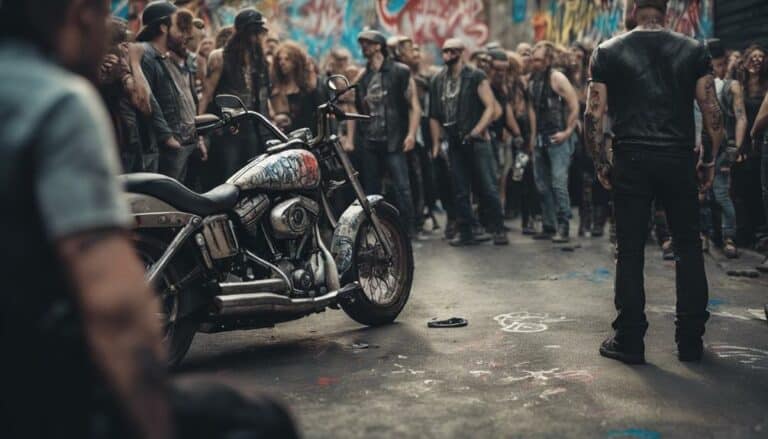You might argue that the dislike towards Harley Davidson is simply a matter of personal preference, but there are deeper layers to this sentiment.
Have you ever considered why some individuals hold strong negative feelings towards this iconic motorcycle brand?
From the distinctive roar of their engines to the cultural stereotypes associated with Harley riders, there are multifaceted reasons behind the animosity towards Harley Davidson that might surprise you.
Key Takeaways
- Quality and reliability concerns with frequent breakdowns and recalls
- Perceptions of Harley riders as loud, rebellious, and traditional
- Competition challenges in appealing to younger riders and diverse styles
- Stereotypes of Harley enthusiasts as overly loyal, attention-seeking, and lacking in performance
History of Harley-Davidson Branding
The evolution of Harley-Davidson's branding can be traced back to its founding in 1903 in Milwaukee, Wisconsin, by William S. Harley, Arthur Davidson, Walter Davidson, and William A. Davidson. From the early beginnings, Harley-Davidson has established itself as a symbol of American motorcycle culture, with the iconic Bar and Shield logo first introduced in 1910. This logo hasn't only represented the company but has become synonymous with freedom, individuality, and the open road.
Harley-Davidson's branding journey has been shaped by its motorcycles gaining popularity among various segments, including police departments, the military, and civilian riders. This widespread adoption contributed significantly to the brand's rugged and adventurous image. Additionally, the establishment of the Harley Owners Group (H.O.G.) in 1983 further solidified the sense of community and camaraderie among Harley-Davidson enthusiasts worldwide, reinforcing the brand's loyalty and connection with its customers.
Throughout its history, Harley-Davidson has navigated challenges, such as financial downturns and competitive pressures, but its strong branding and loyal customer base have helped it endure and thrive.
Perceptions of Harley Riders
Despite varying perspectives and stereotypes, perceptions of Harley riders are deeply influenced by notions of brand loyalty, patriotism, and individuality within the motorcycle community.
Some view Harley riders as exhibiting extreme brand loyalty and patriotism, while non-Harley riders may perceive them as attention-seeking.
Furthermore, sport bike riders often see Harley-Davidson enthusiasts as lacking in performance compared to their sleeker counterparts.
The choice of riding a Harley or not can be a loaded one, as certain groups consider not riding a Harley as unpatriotic.
Harley riders are sometimes judged for their choice of motorcycle brand and riding style, leading to a complex interplay of biases and preconceptions within the broader motorcycle community.
These perceptions highlight the intricate dynamics at play among Harley riders and non-Harley riders, showcasing how personal preferences and societal expectations intersect within the realm of motorcycle culture.
Quality and Reliability Concerns
Harley-Davidson motorcycles have garnered criticism for their quality control issues and reliability concerns. Some Harley owners have reported experiencing frequent breakdowns and mechanical issues with their bikes, leading to frustrations and a dent in the brand's reputation. Consumer surveys have consistently shown Harley-Davidson receiving lower reliability ratings when compared to its competitors in the motorcycle industry. Quality control problems have even resulted in recalls and warranty claims for various Harley-Davidson models, indicating systemic issues that need to be addressed. The perception of Harley-Davidson's quality and reliability problems has contributed significantly to the negative attitudes some people hold towards the brand.
| Quality Control Issues and Reliability Concerns |
|---|
| Harley owners report frequent breakdowns and mechanical problems |
| Consumer surveys show lower reliability ratings for Harley-Davidson |
| Quality control problems lead to recalls and warranty claims |
| Negative attitudes towards the brand due to perceived issues |
Cultural and Societal Stereotypes
With the prevalence of cultural and societal stereotypes surrounding Harley-Davidson riders, perceptions and attitudes towards the brand are influenced by preconceived notions that shape public opinion and interactions within the motorcycling community. These stereotypes often depict Harley-Davidson riders as:
- Loud: The image of riders revving their engines and creating noise pollution contributes to the perception of them being disruptive.
- Rebellious: The association with rebellion and non-conformity adds to the mystique surrounding Harley-Davidson riders.
- Traditional: Seen as holding onto old-fashioned values and resisting modern trends, Harley-Davidson riders are sometimes viewed as stuck in the past.
These stereotypes, perpetuated through media representations and popular culture, not only impact how outsiders perceive Harley-Davidson riders but also influence the dynamics within the broader motorcycling community. Breaking free from these stereotypes can lead to a more inclusive and understanding environment for riders of all backgrounds.
Competition and Market Trends
In the competitive heavy cruiser market, Harley-Davidson contends with rival brands like Indian and Ducati for market share and consumer loyalty. Market trends indicate a shift towards younger riders who favor diverse motorcycle styles, challenging Harley-Davidson's traditional dominance. Japanese manufacturers must adapt their bikes to compete with Harley-Davidson's unique allure, catering to evolving consumer preferences.
The brand's iconic image and culture, while attractive to some, present obstacles in appealing to new customers who may seek different experiences. As market dynamics evolve, Harley-Davidson faces the task of maintaining relevance while addressing the changing landscape of real motorcyclists' desires. Adapting to these market trends is crucial for Harley-Davidson to retain its position in the heavy cruiser segment and stay competitive against emerging preferences and challengers in the motorcycle industry.
Conclusion
As you navigate the winding roads of motorcycling culture, the dislike towards Harley Davidson may seem like a dark storm cloud looming overhead. However, remember that every brand has its critics, every rider their preferences.
Like a roaring thunderstorm that eventually clears, perceptions can shift and opinions can evolve. Embrace the diversity of the motorcycle community, and you may find that beneath the surface lies a shared passion for the open road.

